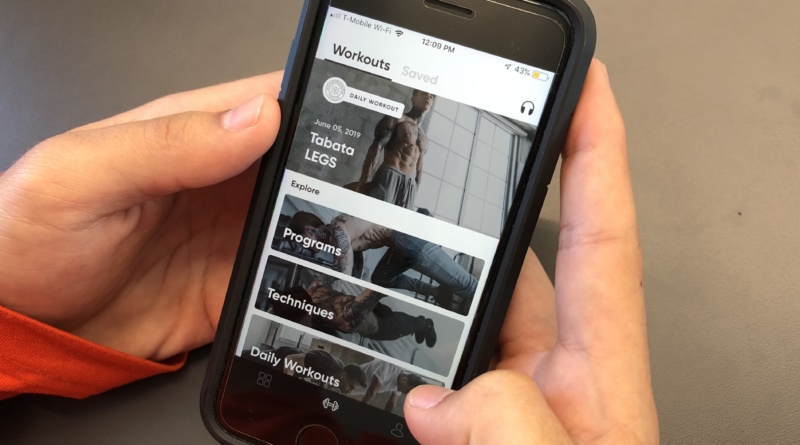Emerging lifestyle apps are varied, effective
By Lyah Fitzpatrick, Katrina Haws & Dahlia Kraus,
BlueDevilHUB.com Staff–
Sophomore Elizabeth Young uses the Garmin app on her phone, which connects to the watch on her wrist. The app condenses several types of health apps into one database. Watch the video below to see how it works.
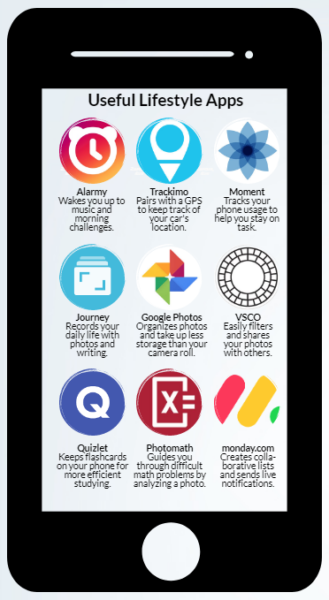
An app to track your diet. An app to help you focus. An app to keep you fit. The era of mobile devices arrives with a complimentary package: lifestyle apps that can help keep your life in check.
According to Statista, consumers downloaded 178 billion apps in 2017, a number projected to reach 205 billion this year.
More specifically, Statista notes that 65.2 percent of mobile device users have health and fitness apps on their gadgets, almost two out of every three people.
And behind the consumer statistics, developing these apps is no easy task.
“There’s a lot of moving parts and pieces that have to be put together,” said Deema Tamimi, app developer and CEO of Caneberry and Giving Garden.
But the efforts of lifestyle app developers do not go to waste, as these apps are being used more and more.
Derek Wu, Franco Sanchez, Allison Ayers and Emma Carney are four DHS students who integrate health and fitness apps into their lives.
From Phone to Fit
About five times every week, sophomore Derek Wu scrolls through his ThenX app, selects a specialized workout and gets going.
The app demonstrates techniques and exercises in instructive videos that Wu mimics. He says following the trainers is motivational “because you’re not just doing it by yourself.”
Wu says that although there are many workout videos on YouTube, ThenX is more relevant for him because it caters to a selected fitness level. He also believes it is more convenient because the videos are well designed.
Most workout apps advertise similar messages: Nike Run Club “has the tools you need to run better”, FitnessBuilder “is the portable personal trainer that completely guides your fitness lifestyle”, and Sworkit is “creating long lasting, generational impact”.
But these uplifting descriptions that attract thousands of people are not always successful.
Despite nearly 60 percent of Americans downloading a fitness app onto their smartphones, “those who used fitness apps [generally] saw no greater change in their overall fitness when compared against those who did not use fitness apps,” according to Luth research.
Although Wu finds himself benefiting from workout apps, not all users can confidently say the same. Workout apps promote fitness, but do not guarantee it.
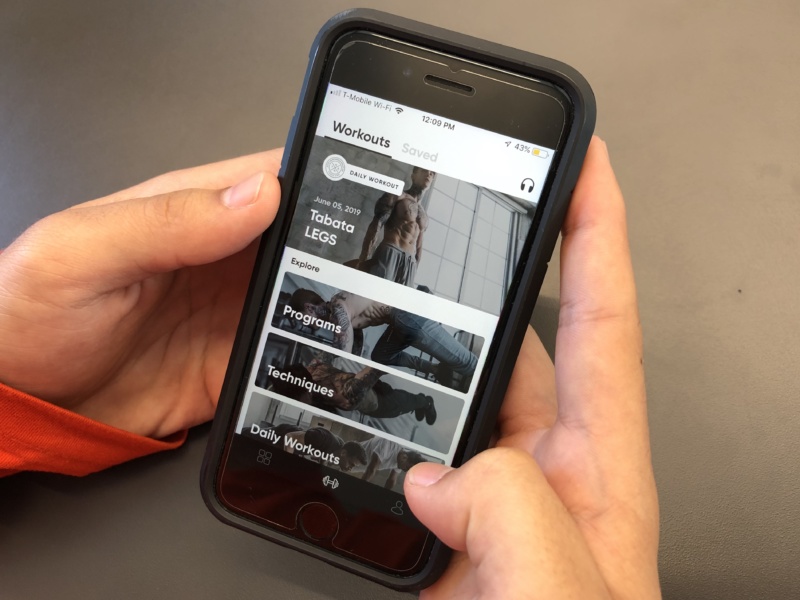
Wu scrolls through a variety of workout videos on his ThenX app.
Tracking Your “App”etite
Sophomore Franco Sanchez lost over 30 pounds since purchasing the myfitnesspal app at the beginning of his freshman year.
Myfitnesspal allows Sanchez to monitor his caloric intake and record daily exercise.
After purchasing the app Sanchez noticed improvements in both his diet and physical activity.
“The app motivated me to start running and it felt better as I ran more often,” Sanchez said.
The app uses a scanning feature and weighing system to determine the calorie count and types of nutrients within foods.
“Since I really like eating more than usual it showed me how much weight I could lose by running and monitoring my calories,” Sanchez said.
The app provides quick access to the nutrition facts of a wide variety of foods and allows users to log and track their lifetime progress.
On the myfitnesspal website, founders claim that “study after study has confirmed the benefits of keeping track of the food you eat and the activity you do.”
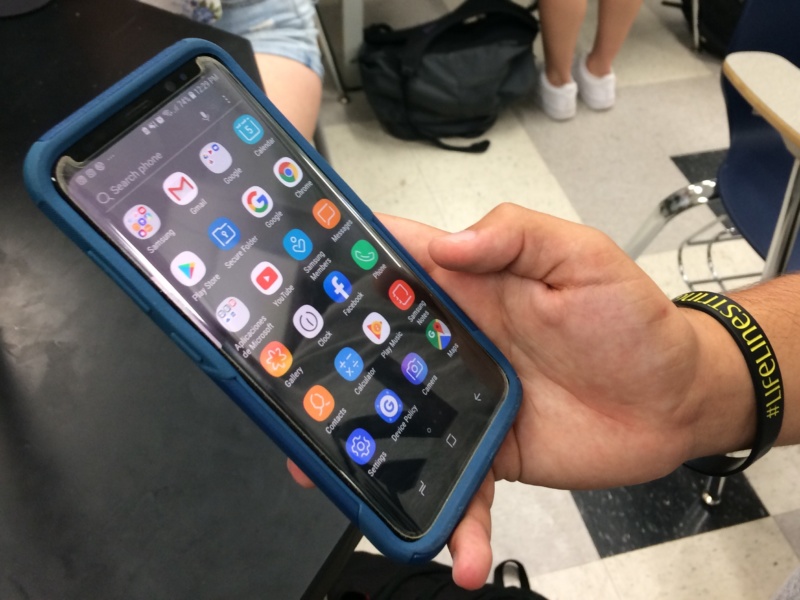
Among Sanchez’s array of apps lies myfitnesspal, which he logs into several times each week.
Mentality Motivation
Senior Allison “Alli” Ayers has combated anxiety and stress with Headspace, a popular sleep and meditation app. The app has proved effective since she began using it around a year ago.
“I saw Headspace so I just downloaded it randomly and was like, ‘I’m gonna try this, see if it helps calm me down,’ and it totally worked so I just kept doing it,” Ayers said.
With the app, she can choose a pre recorded meditation session, set its length and settle down to a soothing voice.
Ayers admits that in her busy life of academics, employment and other commitments, she can feel mentally strained. But Headspace provides her with a way to improve her state of mind.
“It definitely helps me calm down, and just kinda take a step away from everything that’s stressing me out and be really present and in the moment,” Ayers said.
She usually meditates before bed and sometimes in the morning.
But although Headspace can produce tranquility in the moment, it has also benefited Ayers in the long run.
“Meditation in general has really helped with my anxiety over time, and it’s helped me be more present,” Ayers said.
Ayers is not the only person who has experienced the therapeutic ability of a mental health app.
Research claims smartphone based therapies can produce desired results when treating mild to moderate depression and anxiety symptoms, according to mHealth in a study done for the National Institutes of Health.
So next time you’re feeling down, stressed or overwhelmed, maybe think about downloading a meditation app. Then, sit back and relax.
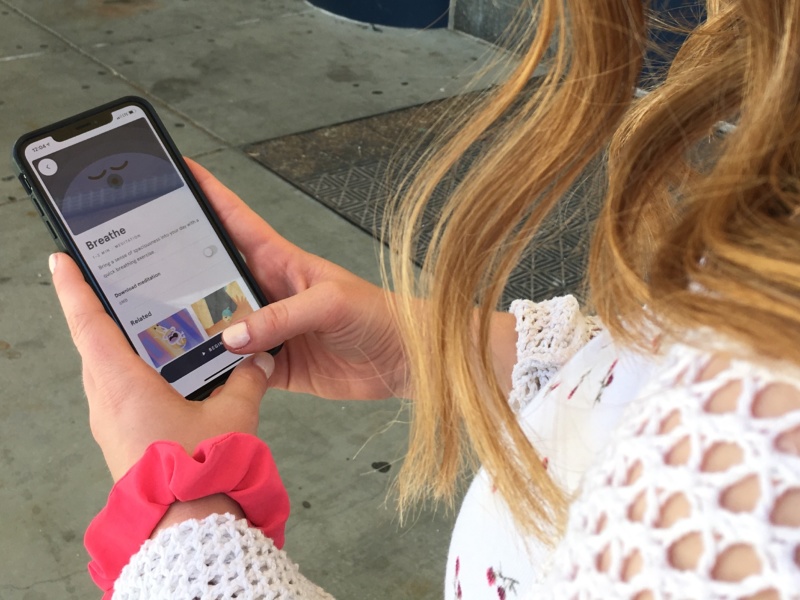
Ayers prepares to relax as she selects a breathing exercise on her Headspace app.
A Narrower Focus
A year ago, sophomore Emma Carney’s doctor recommended she download a period tracker app. Since then, she has benefited from using Flo.
As Carney logs information about her sleep, mood and dates of her periods, the app predicts when her next cycle will begin.
Although Carney has found the app’s predictions to be a few days off, she says it is beneficial because “it makes [her] pay more attention to health.”
Remembering all her small health details can be challenging for Carney, so apps like Flo are useful.
Many other menstrual cycle apps are also available, including Clue, Dot and Cycles.
App developer Tamimi believes specific health apps “are quite valuable, and they’re usually really honed into a specific problem someone’s having.”
There are other examples of health specific apps as well. Bluestay is designed for people with diabetes, and Medisafe reminds people about taking their medications.
But these apps can sometimes hurt more than help.
“On the flip side, we’re also constantly inundated by that information, and I think that has caused people being overwhelmed in life with almost too much information,” Tamimi said. “So, you have these positive things that you’re getting but also have a negative side to them.”
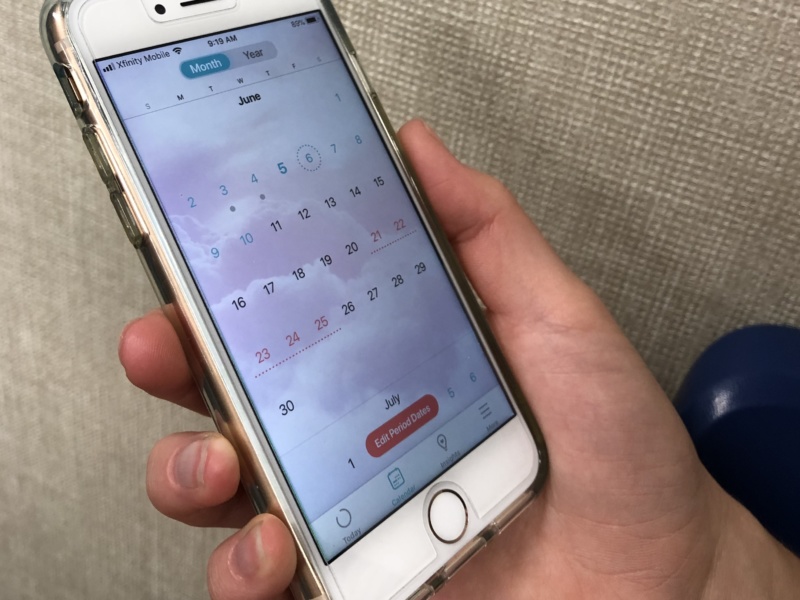
The calendar-like setup of the Flo app allows Carney to quickly scan her health information and see when her next period is predicted to start.

